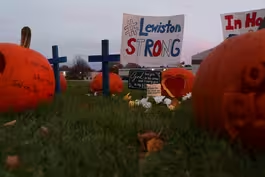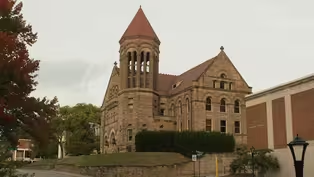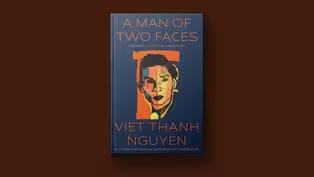
Supreme Court takes on officials blocking online followers
Clip: 10/31/2023 | 6m 1sVideo has Closed Captions
Supreme Court takes on cases involving public officials blocking social media followers
The Supreme Court heard arguments in two key cases about how public officials use social media. The cases explore whether two school board members in California and a city manager in Michigan violated the First Amendment by blocking constituents from posting criticism on their personal social media pages. Geoff Bennett discussed the stakes with NewsHour Supreme Court analyst Marcia Coyle.
Problems playing video? | Closed Captioning Feedback
Problems playing video? | Closed Captioning Feedback
Major corporate funding for the PBS News Hour is provided by BDO, BNSF, Consumer Cellular, American Cruise Lines, and Raymond James. Funding for the PBS NewsHour Weekend is provided by...

Supreme Court takes on officials blocking online followers
Clip: 10/31/2023 | 6m 1sVideo has Closed Captions
The Supreme Court heard arguments in two key cases about how public officials use social media. The cases explore whether two school board members in California and a city manager in Michigan violated the First Amendment by blocking constituents from posting criticism on their personal social media pages. Geoff Bennett discussed the stakes with NewsHour Supreme Court analyst Marcia Coyle.
Problems playing video? | Closed Captioning Feedback
How to Watch PBS News Hour
PBS News Hour is available to stream on pbs.org and the free PBS App, available on iPhone, Apple TV, Android TV, Android smartphones, Amazon Fire TV, Amazon Fire Tablet, Roku, Samsung Smart TV, and Vizio.
Providing Support for PBS.org
Learn Moreabout PBS online sponsorshipGEOFF BENNETT: The U.S. Supreme Court heard arguments in two key cases today about how public officials use social media.
The cases explore whether two school board members in California and a city manager in Michigan violated the First Amendment by blocking constituents posting criticism on their personal social media pages.
The constituents in the cases believe these social media pages were actually operating as an extension of government work.
To help us understand the stakes here, we're joined by our Supreme Court analyst Marcia Coyle.
It is always good to see you.
MARCIA COYLE: Good to see you, Geoff.
GEOFF BENNETT: So, Marcia, you were in the courtroom for the, what, three hours of proceedings.
MARCIA COYLE: Three long hours.
(LAUGHTER) GEOFF BENNETT: So, what's the question that the justices were considering today in both arguments?
MARCIA COYLE: Well, the challenge here for the justices is to determine how can you know when a public official is speaking in his or hers official capacity or personal capacity in their -- on their personal web pages?
And the distinction is important, because, if it's in the official capacity, what we call a state actor, then the First Amendment kicks in.
And that public official could be held liable for violating the rights of someone who may have been blocked.
GEOFF BENNETT: So, in the one case, there's James Freed.
He's the city manager in Port Huron, Michigan.
He has this personal Facebook page where he mostly posted about his family, but he also during the pandemic would post about COVID and other city-related matters.
And he blocked from his Facebook page a man named Kevin Lindke after Lindke posted criticism of the ways in which Freed was handling the pandemic.
And so our team spoke with both men about how they see the case.
Here's what they had to say.
JAMES FREED, City Manager, Port Huron, Michigan: schoolteachers, police officers, firefighters, school custodians, like my grandfather was, can't go home and talk about what happened at work?
Just think of the chilling effect that would have on those people.
I have -- I have a right for speech.
In the middle of a COVID pandemic, I have a right to communicate with my friends and family and what's going on in our lives and what's going on with our community.
KEVIN LINDKE, Petitioner: He can say that this was his personal page.
I don't necessarily disagree with that.
The issue is that when he started blurring the lines and started putting out policy directives that couldn't be found anywhere else, he then created a public forum.
And, therefore, the protection of the First Amendment kicked in.
And by blocking stuff he didn't like or stuff that was critical of him, we felt that was just -- he was trying to silence us.
GEOFF BENNETT: So tell us more about how the justices interpreted those two arguments.
MARCIA COYLE: I will tell you, Geoff, during the three hours, there were lots of hypotheticals about what kind of posts on a social media page could constitute either private speech or official speech.
There was even mention of Donald Trump, and even Taylor Swift entered the conversation.
GEOFF BENNETT: Because Donald Trump, when he was president, he blocked people.
MARCIA COYLE: Absolutely, on Twitter, which is now known as X. GEOFF BENNETT: On Twitter.
MARCIA COYLE: But his case ultimately was mooted out because he was no longer president.
But what was happening in the arguments was, the lawyers were trying to offer the justices a variety of tests for how to make this distinction between the two.
And the public officials really want a clearly defined, kind of rigid test that says, basically, if you are fulfilling a duty on your personal Web page, or you are demonstrating authority, then you are state action, and the First Amendment will apply.
And the individuals who are blocked, their lawyers were telling the court, no, that's too narrow a test.
And we think you need a broader test.
One lawyer described it as, are you doing your job test, which looks at the content of the page, the appearance of the page, and the function that the public official serves.
The justices had some qualms about both tests.
One was considered a little too narrow and would chill speech.
The other was considered too broad.
And I think, ultimately, Justice Kagan sort of hit the nail on the head on what the justices were facing.
She said, what makes these cases hard is that there are First Amendment interests on both sides.
Public officials have every right to engage in the kind of speech you and I do, to talk about their jobs, to talk about a job with someone in the grocery store, talk about family, friends, pets.
But an individual has a right to be able to access information that -- government information that may be important to their lives, as well as to share in the conversation on that page with other commenters.
So I think they're struggling here not only with, what's the right test, but also, what is a social media page or account?
There was a comment by Chief John Roberts at one point, who said, basically, what is it?
Is it a gathering of protons or what?
(LAUGHTER) MARCIA COYLE: Is this really property?
So, it's a dilemma for them, and they have got opportunities.
I could not tell which way they were going to go on this at all.
GEOFF BENNETT: And we should say, these two cases, these are not the only social media cases coming before the court this term.
MARCIA COYLE: No, they're not.
GEOFF BENNETT: It's such a sign of the times that social media is so big this term.
MARCIA COYLE: Lots of issues.
They have three more cases that they're going to be looking at, probably hearing arguments in the new year.
The cases today are significant in their own right as to what they will do in terms of speech.
The -- when you put them together with the other three cases, it becomes a huge term for not only social media, but also for the First Amendment.
GEOFF BENNETT: Marcia Coyle, I have to say, I'd never block you on social media.
(LAUGHTER) MARCIA COYLE: Thanks, Geoff.
GEOFF BENNETT: Thanks so much for your insight and analysis.
MARCIA COYLE: Take care.
Alabama jail accused of mistreating pregnant detainees
Video has Closed Captions
Clip: 10/31/2023 | 6m 8s | Alabama jail accused of mistreating pregnant detainees, putting unborn children at risk (6m 8s)
Israeli airstrike hits refugee camp in northern Gaza
Video has Closed Captions
Clip: 10/31/2023 | 11m 56s | Israeli airstrike hits refugee camp in northern Gaza, killing and wounding civilians (11m 56s)
Maine gunman's family flagged behavior before shooting
Video has Closed Captions
Clip: 10/31/2023 | 6m 48s | Police scrutinized after revelations Maine shooter's family flagged his behavior (6m 48s)
Students protest WVU cuts targeting academic programs, jobs
Video has Closed Captions
Clip: 10/31/2023 | 9m 11s | Students protest West Virginia Univ. budget cuts targeting academic programs and jobs (9m 11s)
Viet Thanh Nguyen's memoir reflects on experience of war
Video has Closed Captions
Clip: 10/31/2023 | 7m 38s | Author Viet Thanh Nguyen's new memoir reflects on family's experience of war and exile (7m 38s)
Providing Support for PBS.org
Learn Moreabout PBS online sponsorshipSupport for PBS provided by:
Major corporate funding for the PBS News Hour is provided by BDO, BNSF, Consumer Cellular, American Cruise Lines, and Raymond James. Funding for the PBS NewsHour Weekend is provided by...
















